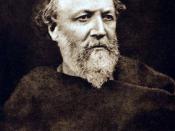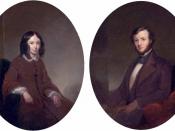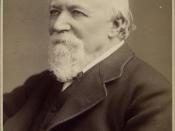In this essay, I would like to discuss one of Robert Browning's more unsettling poems, "Porphyria's Lover." The poem is a dramatic monologue of sorts, though different from Browning's most famous dramatic monologue, "My Last Duchess." In contrast to "My Last Duchess" in which the Duke regales a Count's envoy with tales of his former duchess, Porphyria's lover is not addressing any other living person. Of course, this makes the monologue of Porphyria's lover all the more dramatic. In keeping with the most important quality of dramatic monologues, the character of Porphyria's lover is adequately and disturbingly revealed through his words.
The poem begins with an apt personification of a stormy night which serves as the backdrop to the speaker's own disquieting thoughts ("The rain set early in tonight, / The sullen wind was soon awake, / It tore the elm-tops down for spite, / And did its worst to vex the lake").
This effectively sets the mood as the poem's unnamed lover is anxiously waiting for Porphyria to join him inside a cottage ("I listened with heart fit to break"). When she finally arrives, Porphyria makes things well inside the cottage in contrast to the harsh conditions outside ("When glided in Porphyria; straight / She shut the cold out and the storm, / And kneeled and made the cheerless grate / Blaze up, and all the cottage warm"). Porphyria's loving presence stands in contrast to the cold weather conditions and, as we will later learn, to the cold calculations of her lover.
According to how she is next described after bringing warmth to the cottage, it would appear Porphyria is an upper class lady of the nineteenth century ("Which done, she rose, and from her form / Withdrew the dripping cloak...



Woow..
this essay is amazing...I love it
1 out of 1 people found this comment useful.